Peter Selgin's Blog, page 4
March 24, 2014
The Tiresomeness of the Hedgehog: Some Books on Tape
 Lately I find I can’t read anything, or maybe I can’t find anything worth reading, I’m not sure. I get halfway through a book, or less than halfway, a third of the way, a quarter, a chapter, three pages, two paragraphs—and I can’t go on. It’s not just a matter of the effort required to read a book. Books on tape have also failed me—or I’ve failed them. I’m not the type who reads books on tape, at least I never thought of myself as the type. But should you find yourself driving regularly nine...
Lately I find I can’t read anything, or maybe I can’t find anything worth reading, I’m not sure. I get halfway through a book, or less than halfway, a third of the way, a quarter, a chapter, three pages, two paragraphs—and I can’t go on. It’s not just a matter of the effort required to read a book. Books on tape have also failed me—or I’ve failed them. I’m not the type who reads books on tape, at least I never thought of myself as the type. But should you find yourself driving regularly nine...
Death on the Freeway
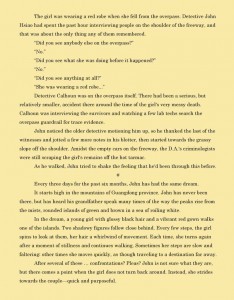 A detective at the scene of a possible murder. A woman has fallen from an overpass. Or was she pushed? Eyewitnesses say the woman wore a red robe.
A detective at the scene of a possible murder. A woman has fallen from an overpass. Or was she pushed? Eyewitnesses say the woman wore a red robe.
A corpse, a private (or public) investigator, a suspicion of foul-play: all standard ingredients of a subset of the mystery genre known as crime or detective fiction, a genre dating back to the One Thousand and One Arabian Nights. Among the tales Sheherezade spins to keep from losing her head, The Three Apples (a.k.a. “The Tale of the Murdered Young...
The Ripening
I was making the usual circuit to a neighbor’s dock and back when it happened. Halfway there, a distance of less than half a mile, I felt a sudden tightening in my chest—not a painful tightening, just a kind of restriction. I lost my breath. Suddenly a thought that rarely occurred to me when swimming presented itself with the authority of a billboard or a news bulletin: you may drown.
I tried to ignore it at first. It was around noon, Memorial Day weekend, and there were many boats disturbing...
Narrating From the Great Beyond
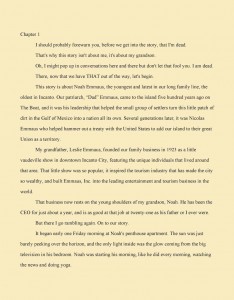
I remember my first encounter with a dead narrator. It was at a screening of Sunset Boulevard at a revival house in Greenwich Village. Anyone who’s seen Billy Wilder’s classic film noir will remember the opening shot of a suited man floating face-down in Nora Desmond’s swimming pool, as the voiceover intones (slyly and cynically, as befitting a film noir narrator): “Yes, this is Sunset Boulevard, Los Angeles, California. It’s about five o’clock in the morning. That’s the Homicide Squad — comp...
A Hole in Your Heart
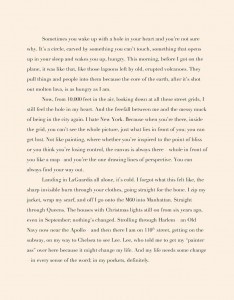
The invention of airlines has fostered a grand tradition of novels and stories opening at cruising altitude, with characters bound toward or departing from the places where their stories have taken or are about to take place. One such novel, Erica Jong’s Fear of Flying, honors that tradition through its brilliant opening line, “There were 117 psychoanalysts on the Pan Am flight to Vienna and I had been treated by at least six of them.” Salman Rushdie’s The Satanic Versus twists the convention...
Halfway to Anywhere
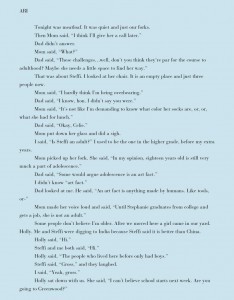 To render a child’s world and perceptions in a first person narrative without being childish: that’s the challenge confronted and largely met by this opening passage.
To render a child’s world and perceptions in a first person narrative without being childish: that’s the challenge confronted and largely met by this opening passage.
First person narratives present severe limitations, and none more than those where the narrator is an adolescent, or, worse, a child. Not only are diction, syntax, and grammar restricted, so are the narrator’s thoughts and perceptions. And what about style? Isn’t a sophisticated or “literary” style incompatible with an immature s...
Beneath
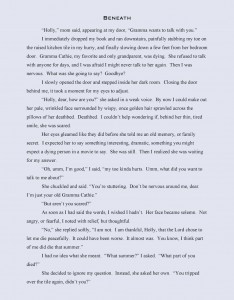 A dying woman shares a secret memory with her grandson or granddaughter. A classic opening strategy: the deathbed scene that will (I presume) serve as a portal to grandma’s confession about “that summer” when “part of” her died.
A dying woman shares a secret memory with her grandson or granddaughter. A classic opening strategy: the deathbed scene that will (I presume) serve as a portal to grandma’s confession about “that summer” when “part of” her died.
The device is known as a “framing device,” i.e. the grandmother’s deathbed scene will serve as a frame through which we’ll experience all or part of her life (through an extended flashback as told to her granddaughter).
Many good stories have been told this way. Lord By...
Bella Luna
 Driving to his half-time teaching job in New Jersey (how he hates this gloomy morning commute, especially now that Daylight Savings Time has robbed him of an hour, turning 5 a.m. into 6 a.m.—the lights on, defroster blowing, wipers thwacking ineffectually at frost, the radio filling the car with the latest floods, genocides, earthquakes, terrorist attacks, floods and famines) he relives the fight he had with his wife over the weekend.
Driving to his half-time teaching job in New Jersey (how he hates this gloomy morning commute, especially now that Daylight Savings Time has robbed him of an hour, turning 5 a.m. into 6 a.m.—the lights on, defroster blowing, wipers thwacking ineffectually at frost, the radio filling the car with the latest floods, genocides, earthquakes, terrorist attacks, floods and famines) he relives the fight he had with his wife over the weekend.
They had gone to Little Italy to join a group of people lea...
Room 310
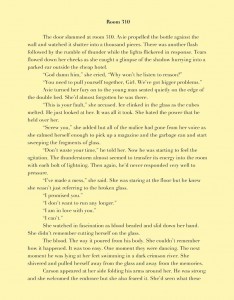
A thunderstorm. A motel room. A couple “on the rocks” in every sense of that phrase. Blood, booze, tears. And a memory of more violence. The material is sensational, even lurid. And like all sensational material it presents problems and risks: namely, cliché and sentimentalism.
Unfortunately, this author fails to avoid either. It’s one thing to present characters in violent scenes or circumstances; it’s another to present the violence without the characters. Here, we are treated to violent dia...
My New York: I
 His “business trips,” my father called them. My brother George and I took turns, one of us going every other Friday. The first time I would have been five or six years old. It took only an hour or so to get there, but as far as I was concerned we might as well have been blasting off for the far side of the moon. We rode in Papa’s Simca, an off-white Chatelaine station wagon with white walls and a split tailgate. I’d watch him work the gearshift, a thin chrome shaft with a pear-shaped white...
His “business trips,” my father called them. My brother George and I took turns, one of us going every other Friday. The first time I would have been five or six years old. It took only an hour or so to get there, but as far as I was concerned we might as well have been blasting off for the far side of the moon. We rode in Papa’s Simca, an off-white Chatelaine station wagon with white walls and a split tailgate. I’d watch him work the gearshift, a thin chrome shaft with a pear-shaped white...



